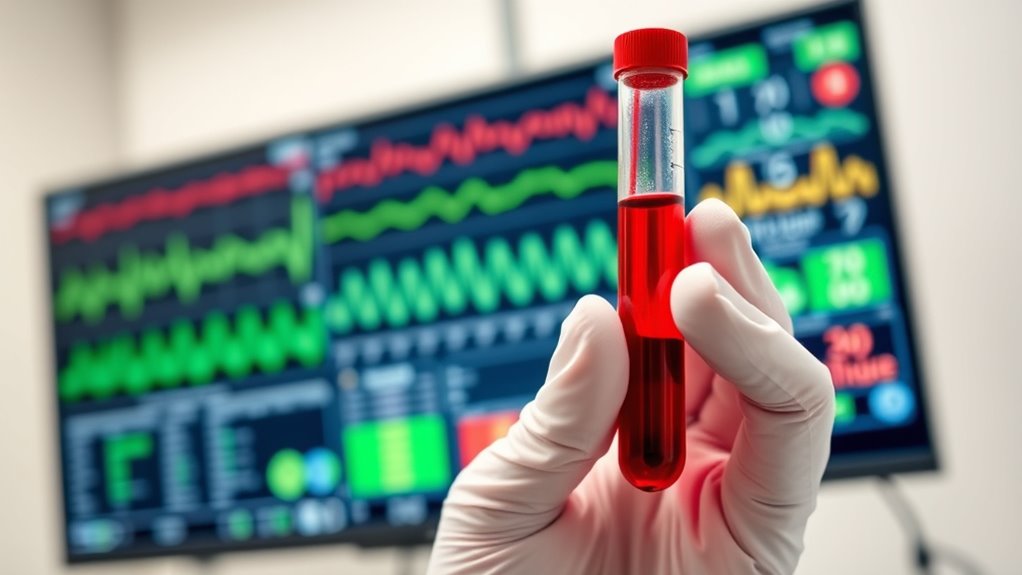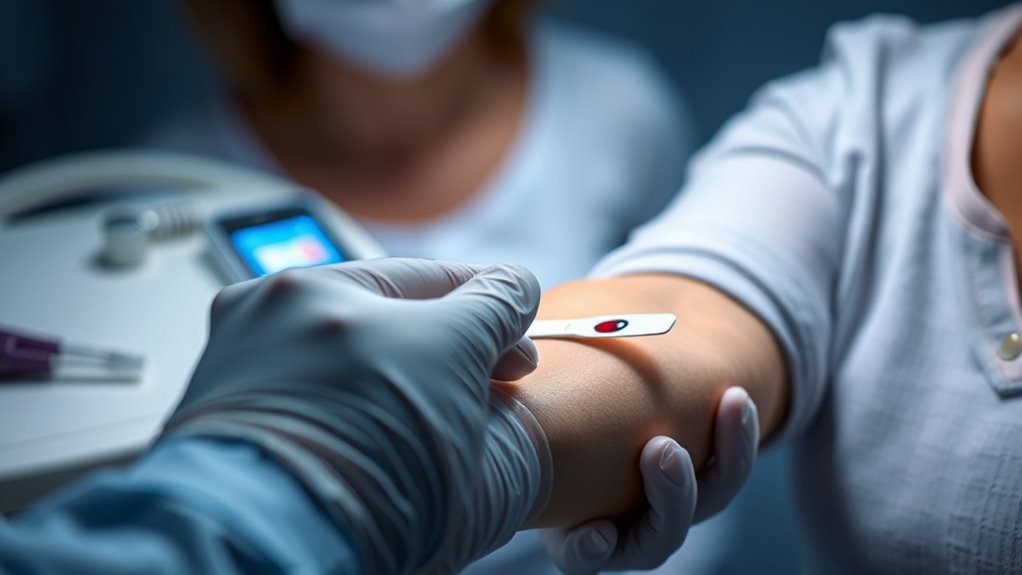In your 40s, getting screened for heart disease is key to catching risk factors early. Your doctor may recommend blood tests like cholesterol, blood sugar, and inflammatory markers, along with blood pressure checks. Non-invasive imaging such as calcium scans or ultrasounds can reveal early signs of heart issues. Regular screenings every 1 to 3 years help you stay ahead of potential problems. Keep exploring to discover how lifestyle changes can further protect your heart health.
Key Takeaways
- Regular blood tests, including lipid panels and blood sugar levels, help identify early risk factors for heart disease.
- Non-invasive imaging tests like coronary calcium scans and echocardiograms can detect signs of atherosclerosis before symptoms appear.
- Blood pressure monitoring is essential to catch hypertension early, reducing future heart complication risks.
- Lifestyle assessments and risk factor screenings every 1 to 3 years enable proactive management of heart health.
- Personalized screening plans based on family history and lifestyle habits improve early detection and prevention strategies.
Understanding Heart Disease Risks in Your 40s

Your 40s are a crucial time to understand your heart disease risks, as many factors that contribute to heart problems begin to develop during this decade. During this period, you might notice lifestyle habits or health changes that increase your risk, such as weight gain, high blood pressure, or elevated cholesterol levels. Family history also plays a role, so knowing your relatives’ heart health history is essential. Smoking, poor diet, physical inactivity, and stress further heighten your chances of developing heart issues. Recognizing these risks now helps you take proactive steps to reduce them. Being aware of screening guidelines can help you stay on top of early detection and prevention. The earlier you understand these factors, the better you can implement healthy habits and seek medical advice to protect your heart in the years ahead.
Key Blood Tests to Monitor Heart Health

Monitoring your heart health through key blood tests provides crucial insights into potential risks before symptoms appear. The most common test is the lipid panel, which measures your cholesterol levels—total cholesterol, LDL (“bad” cholesterol), HDL (“good” cholesterol), and triglycerides. High LDL and triglycerides can increase your risk of plaque buildup in arteries. Another important test is the high-sensitivity C-reactive protein (hs-CRP), which detects inflammation linked to heart disease. Additionally, your doctor might check your blood sugar levels or HbA1c to assess diabetes risk, a major factor in heart health. These tests help identify early warning signs, allowing you to take preventive steps. Regular screening ensures you stay ahead of potential issues, making it easier to maintain a healthy heart in your 40s and beyond. Incorporating natural elements into your environment may also promote overall well-being and reduce stress, supporting heart health.
The Role of Blood Pressure Screening

Blood pressure screening plays a vital role in evaluating your heart health, complementing blood tests that reveal cholesterol and inflammation levels. Regular checks help catch high blood pressure early, reducing your risk of heart disease. When you get your blood pressure measured, it provides immediate insight into how your heart and blood vessels are functioning. Automation in healthcare technologies are increasingly used to monitor blood pressure remotely, making regular screenings more accessible.
Lipid Profile and Cholesterol Checks

Getting your lipid profile and cholesterol checked regularly helps you stay on top of your heart health. Understanding what your test results mean can guide you to make better lifestyle choices. Knowing how to interpret these numbers is key to managing your risk effectively. Regular testing can also help identify early signs of heart disease, making preventive measures more effective.
Importance of Regular Testing
Regular testing of your lipid profile and cholesterol levels is essential because it helps identify early signs of heart disease before symptoms appear. Catching issues early allows you to make lifestyle changes or start treatments that can prevent serious problems down the line. Regular tests also give you a clear picture of your heart health over time, helping you track progress and stay motivated. Incorporating good lighting and natural materials in your environment can also contribute to a sense of well-being. Here are four reasons why regular testing matters: 1. Detects hidden risk factors before symptoms develop 2. Guides personalized prevention strategies 3. Monitors effectiveness of lifestyle or medication changes 4. Provides peace of mind by knowing your heart health status
Staying consistent with testing empowers you to take proactive steps and stay ahead of potential heart issues.
Interpreting Lipid Results
Understanding your lipid profile results is key to evaluating your heart health, as these numbers reveal the levels of cholesterol and fats in your blood. Your report typically includes total cholesterol, LDL (“bad” cholesterol), HDL (“good” cholesterol), and triglycerides. A high LDL level increases your risk for plaque buildup in arteries, while higher HDL can protect your heart. Triglycerides indicate the amount of fats circulating in your blood; elevated levels may signal metabolic issues. To interpret these results accurately, consider the recommended ranges: total cholesterol below 200 mg/dL, LDL under 100 mg/dL, HDL above 60 mg/dL, and triglycerides below 150 mg/dL. Regular screening for symptoms of heart disease is essential for early detection and prevention. Talk with your healthcare provider about what your results mean for your individual risk and what lifestyle changes or treatments may be necessary.
The Importance of Blood Sugar Testing

Monitoring your blood sugar levels is essential for detecting diabetes early, which can greatly impact your heart health. High blood sugar often shows no symptoms but can lead to serious complications if left unchecked. Regular testing helps you stay proactive and protect your cardiovascular well-being. Understanding your blood sugar levels can also inform your overall health decisions and lifestyle choices.
Blood Sugar Levels
Have you ever wondered how blood sugar levels can impact your heart health? Keeping track of your blood sugar is essential because high levels can increase your risk of heart disease. When blood sugar stays elevated, it damages blood vessels and promotes inflammation, making your heart work harder. Monitoring your levels helps you spot issues early and make lifestyle changes. Here’s what you should know:
- Elevated blood sugar can lead to insulin resistance, raising heart disease risk
- It contributes to high blood pressure and cholesterol problems
- Stable blood sugar supports healthy blood vessels
- Regular testing guides dietary and activity adjustments to protect your heart
- Maintaining balanced blood sugar levels can also help prevent the development of pinball machines, which are popular for home entertainment and may indirectly promote a more active lifestyle.
Understanding your blood sugar levels empowers you to take control and reduce your risk of heart problems.
Detecting Diabetes Early
Detecting diabetes early is essential because it allows you to take control before serious health complications develop. Regular blood sugar testing helps identify issues before symptoms appear, making treatment more effective. Early detection can prevent heart disease, nerve damage, and kidney problems. When you get tested, you’re actively managing your health rather than waiting for problems to worsen. Here’s a quick overview of what blood sugar levels might indicate:
| Blood Sugar Level | Interpretation |
|---|---|
| Normal | Less than 100 mg/dL |
| Prediabetes | 100-125 mg/dL |
| Diabetes | 126 mg/dL or higher |
| Fasting Test | Blood sugar after fasting |
| Post-Meal Test | Blood sugar after eating |
Regular testing keeps you in the know and helps you stay ahead of potential issues. Understanding blood sugar levels and their implications is crucial for effective management.
Non-Invasive Imaging Options

Are non-invasive imaging options truly revolutionizing how you screen for heart disease? Absolutely. These advanced tools let you assess your heart’s health without surgery or needles. Here are four key options:
- Coronary Calcium Scan – Detects calcium deposits in your arteries, revealing early signs of atherosclerosis.
- Echocardiogram – Uses ultrasound to visualize heart structure and function in real-time.
- Stress Test (Exercise or Chemical) – Evaluates how your heart performs under stress, spotting issues that rest tests might miss.
- Cardiac MRI – Provides detailed images of your heart’s anatomy, helping identify damage or abnormalities.
These methods offer quick, safe insights, enabling early intervention and personalized treatment plans. They’re transforming heart disease screening, making it more effective and less invasive. Ongoing monitoring with these technologies can also help detect changes over time, improving long-term health management.
When and How Often to Get Screened

Non-invasive imaging tools are changing how we monitor heart health, making it easier to catch issues early. If you have risk factors like high blood pressure, high cholesterol, or a family history of heart disease, you should consider getting screened every 1 to 3 years. For those with no risk factors, a screening every 3 to 5 years may suffice. Your doctor will recommend the appropriate schedule based on your health profile. Typically, initial screening involves a detailed health history, physical exam, and possibly an imaging test like an echocardiogram or CT scan. Regular check-ins help track changes over time and catch problems before symptoms appear. Staying proactive with your screenings guarantees you maintain heart health and catch potential issues early.
Lifestyle Changes to Support Heart Well-Being

Making targeted lifestyle changes can considerably improve your heart health and reduce the risk of developing heart disease. Small, intentional adjustments can make a big difference over time. Here are four key steps:
Small lifestyle changes can significantly boost heart health and reduce disease risk.
- Eat a balanced diet rich in fruits, vegetables, whole grains, lean proteins, and healthy fats.
- Exercise regularly, aiming for at least 150 minutes of moderate activity weekly.
- Quit smoking and avoid secondhand smoke to protect your arteries.
- Manage stress through techniques like meditation, deep breathing, or hobbies you enjoy.
Implementing these changes not only benefits your heart but also boosts your overall well-being. Consistency is key—start small and build habits that support a healthier, longer life.
Frequently Asked Questions
Are There Specific Symptoms Indicating Early Heart Disease in My 40S?
You might wonder if there are signs of early heart disease in your 40s. Common symptoms include chest discomfort, shortness of breath, fatigue, and pain radiating to your arm or jaw. You could also notice irregular heartbeat or swelling in your legs. Keep in mind, sometimes early heart disease shows no symptoms. Regular check-ups and discussing your risk factors with your doctor can help catch issues early.
How Do Family History and Genetics Influence My Screening Schedule?
You might think genetics don’t matter if you’re feeling fine, but family history plays a vital role in your screening schedule. If heart disease runs in your family, you’re at higher risk and should start screening earlier and more frequently. Think of it like catching a small fire before it becomes a wildfire—regular checkups help catch issues early, giving you a better chance to stay healthy and avoid serious problems.
Can Lifestyle Changes Reverse Early Signs of Heart Disease?
You can often reverse early signs of heart disease through lifestyle changes. Eating a heart-healthy diet, exercising regularly, quitting smoking, and managing stress make a big difference. These habits help lower cholesterol, blood pressure, and blood sugar. While not all damage is reversible, taking these steps increases your chances of improving your heart health and preventing progression. Stay proactive and committed to healthy choices for the best outcome.
What Are the Latest Advancements in Non-Invasive Heart Screening?
The latest advancements in non-invasive heart screening include highly sensitive imaging techniques like coronary CT angiography, which can detect blockages without invasive procedures. You can also benefit from advanced ultrasound methods such as carotid intima-media thickness scans and heart MRI, offering detailed insights into your heart’s health. These tools help identify early signs of heart disease quickly and safely, empowering you to take action before more serious issues develop.
How Do Mental Health and Stress Impact Heart Disease Risk?
Imagine you’re constantly stressed at work, and it starts affecting your health. Stress and poor mental health can elevate your blood pressure and increase inflammation, raising your risk of heart disease. You might not realize it, but chronic stress triggers hormonal changes that damage your arteries over time. Prioritizing mental wellness, practicing relaxation techniques, and seeking support can markedly reduce your heart disease risk.
Conclusion
So, now that you know the secret recipe—blood tests, screenings, and a dash of lifestyle tweaks—you’re practically a heart health superhero. Who needs a cape when you’ve got regular checkups? Remember, ignoring your heart now just means more drama later. So, go ahead, get screened, make those healthy choices, and keep your ticker ticking happily. Because nothing says “I care” like avoiding a heart catastrophe—preferably with a smile.









